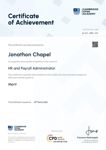Microbial Interactions in Food and the Environment
CPD Accredited | Interactive Learning Materials | PDF Certificate Included | Tutor Support
Cambridge Open Academy
Summary
- Certificate of Completion (PDF) - Free
- Certificate of Completion (Hard Copy) - £9.99
- Exam(s) / assessment(s) is included in price
- Tutor is available to students
Add to basket or enquire
Overview
Uncover the captivating world of microbial interactions in food and the environment with our comprehensive course. Gain a deep understanding of food microbiology, preservation, fermentation, spoilage, and foodborne diseases. Equip yourself with the knowledge to become a proficient food microbiologist and unravel the intricate relationships that shape our culinary experiences.
Learning Outcomes:
- Develop a comprehensive understanding of the principles and significance of food microbiology.
- Analyse the role and impact of predominant microorganisms in various food types.
- Explore the techniques and mechanisms of food preservation employed by microorganisms.
- Investigate the process and benefits of food fermentation facilitated by microorganisms.
- Recognise and prevent food spoilage through effective strategies and control measures.
- Understand the transmission routes and preventive measures for foodborne diseases caused by microorganisms.
Certificates
Certificate of Completion (PDF)
Digital certificate - Included
Certificate of Completion (Hard Copy)
Hard copy certificate - £9.99
Note: Delivery of hardcopy certificate is free within the United Kingdom. However, to obtain a hardcopy certificate, international students have to pay £19.99 for the shipment to their designated address.
CPD
Course media
Description
Microbial Interactions in Food and the Environment is a fascinating course that delves into the microscopic world of microorganisms and their interactions with food and the environment. In this course, you'll learn about the different types of microorganisms found in food, the process of food preservation and fermentation, and the development of foodborne diseases.
Beginning with an in-depth introduction to food microbiology, you will uncover the fundamental principles and concepts that underpin the study of microorganisms in the context of food. From there, you will dive into the diverse world of microorganisms, examining their prevalence in different food types and investigating their complex interactions. Explore the techniques microorganisms employ to preserve food, extend its shelf life, and maintain its quality.
Delve into the intriguing world of food fermentation, understanding the transformative role of microorganisms in enhancing flavours, textures, and nutritional value. Learn to identify the signs and causes of food spoilage and discover effective prevention strategies. Finally, explore the realm of foodborne diseases, studying the transmission routes and exploring preventive measures against microbial contamination.
Who is this course for?
This course is ideal for the following:
- Food science students seeking to deepen their knowledge of food microbiology.
- Professionals working in the food industry are interested in expanding their expertise.
- Researchers and scientists exploring the realm of microbial interactions in food.
- Food enthusiasts and individuals curious about the science behind food preservation and fermentation.
Career path
Some career paths related to this industry in the UK are:
- Food Microbiologist Assistant: £20,000 - £25,000 per annum
- Quality Control Technician: £25,000 - £30,000 per annum
- Food Safety Specialist: £30,000 - £40,000 per annum
- Research Scientist: £35,000 - £50,000 per annum
- Food Microbiologist: £40,000 - £60,000 per annum
- Food Safety Manager: £50,000 - £70,000 per annum
Questions and answers
Currently there are no Q&As for this course. Be the first to ask a question.
Reviews
Currently there are no reviews for this course. Be the first to leave a review.
Legal information
This course is advertised on reed.co.uk by the Course Provider, whose terms and conditions apply. Purchases are made directly from the Course Provider, and as such, content and materials are supplied by the Course Provider directly. Reed is acting as agent and not reseller in relation to this course. Reed's only responsibility is to facilitate your payment for the course. It is your responsibility to review and agree to the Course Provider's terms and conditions and satisfy yourself as to the suitability of the course you intend to purchase. Reed will not have any responsibility for the content of the course and/or associated materials.



